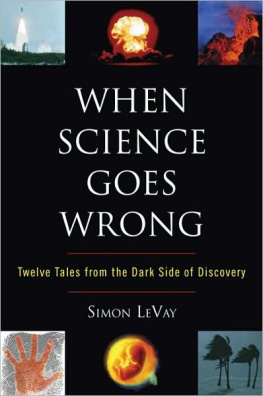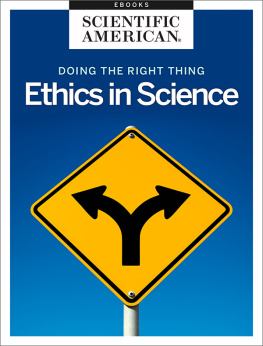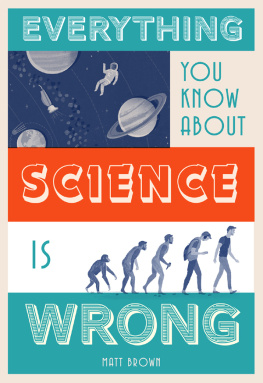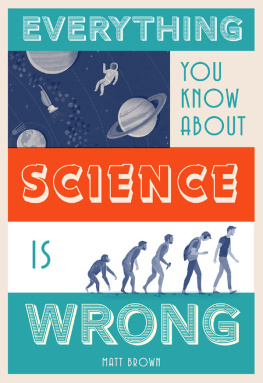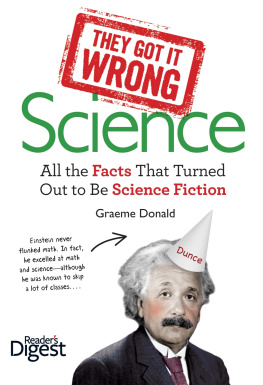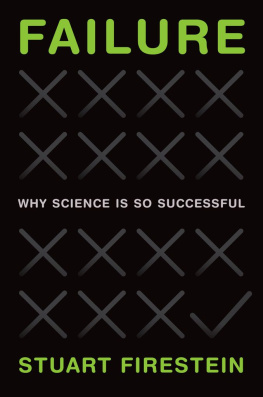
SIMON LEVAY is a British-born neuroscientist who has served on the faculties of Harvard Medical School and the Salk Institute. He is best known for his research into the biological basis of sexual orientation, and he has written or co-authored eight previous books. He lives in West Hollywood, California.
When Science Goes Wrong:
Twelve Tales From The Dark Side Of Discovery
Simon LeVay

Monday Books
www.mondaybooks.com
Simon LeVay 2009
First published in the USA in 2008 by Plume, a member of Penguin Group (USA) Inc
First published in the UK in 2009 by Monday Books
The right of Simon LeVay to be identified as the Author of this work has been asserted by him in accordance with the Copyright, Designs and Patents Act 1988
Excerpt from Biohazard by Ken Alibek Copyright (c) 1999 by Ken Alibek. Used by permission of Random House.
All rights reserved. Apart from any use permitted under UK copyright law no part of this publication may be reproduced, stored in a retrieval system, or transmitted, in any form or by any means, without the prior written permission of the publisher, nor be otherwise circulated in any form of binding or cover other than that in which it is published and without a similar condition being imposed on the subsequent purchaser
A CIP catalogue record for this title is available from the British Library
ISBN: 978-1-906308-08-7
Typeset by Andrew Searle
Printed and bound by TBC
Converted to eBook by ebookgenie.co.uk
www.mondaybooks.com
mondaybooks.wordpress.com
Contents
Preface
MOSTLY, WE HEAR ABOUT sciences triumphs the wonder drugs, the Moon landings, the ever-faster computers. But for every brilliant scientific success there are a dozen failures. Usually these involve no more than some wasted money and a blank spot on someones CV. Once in a while, though, science doesnt just fail it goes spectacularly, even horribly, wrong. And that makes for a great story.
This book is a collection of twelve such stories. They are linked by the common thread of scientific failure, but in other respects they are quite diverse. I wanted, in the first place, to range over many different kinds of science. Some of the chapters relate to explorations within the basic sciences, such as nuclear chemistry, volcanology and neuroscience. The majority, however, focus on the applied sciences, because it is when science serves human ends that the opportunities for truly memorable screw-ups are most likely to arise. These sciences include medical research, forensic science, meteorology, microbiology and psychology. One of the stories deals with an engineering failure, but it was a failure rooted in scientific error.
In addition, I wanted to illustrate the rich variety of ways in which the scientific process can go awry. Failures, disasters and other negative outcomes of science can result not only from bad luck, but also from the failure to follow appropriate procedures or to heed warnings, from confusion of units, from ethical breaches in the treatment of human subjects, from the pressure to get quick results, from excessive ambition or financial greed, from the failure to think broadly enough about the consequences of ones work, or from fraud. Or even from a couple of mislabelled bottles. The stories in this book illustrate the consequences of many of these factors, acting alone or in diabolical combination.
This book is not an attack on science. I am a scientist myself, and I consider science to be one of the most beautiful, challenging and worthwhile activities that humans can engage in. The events described in this book are no more the story of science than plane crashes are the story of aviation. If I thought that the publication of this book would bring the entire cavalcade of science to a jangling halt or even impede its progress in the slightest degree I would not have written it.
The book is also not intended to be a complete or academic survey of scientific failure. There are plenty of sciences that escape mention in these pages, plenty of failure modes that I dont discuss, and plenty of errors more laughable, accidents more tragic, and wrongdoings more egregious. Rather than trying to be comprehensive, I have followed the advice offered to the historian by Lytton Strachey in Eminent Victorians : He will row out over that great ocean of material, and lower down into it, here and there, a little bucket, which will bring up to the light of day some characteristic specimen, from those far depths, to be examined with a careful curiosity.
In keeping with this approach, I have not arranged my specimens into any logical order, based for example on their historical sequence, the scientific disciplines they relate to, or the modes of scientific failure that they exemplify. Instead, I have laid them out on the deck in what I hope is an agreeable pattern, juxtaposing light and dark, new and old, innocent and malevolent. If they coalesce into a larger picture, so much the better.
It is customary in a book of this kind to thank ones sources, but I do so with particular sincerity in this case because some of the people I interviewed were agreeing to talk about episodes in their lives that they would probably rather forget. They had little to gain from reliving those episodes, and I thank them for doing so.
This book is not just about scientific error and wrongdoing, however; it is also about bravery in the face of danger, endurance in the face of suffering and loss, intelligence and persistence in the search for causes, and even sometimes about the right way of doing science. Some of my interviewees exemplify those traits, and I thank them sincerely too.
The complete list of the people I interviewed is as follows: Ken Alibek, Ph.D., Nicoline Ambrose, Ph.D., Colin Blakemore, Ph.D., Oliver Bloodstein, Ph.D., Arthur Caplan, Ph.D., John Casani, Ph.D., Bernard Chouet, Ph.D., Rick Doblin, Ph.D., Raymon Durso, M.D., Robert Erickson, M.D., Michael Fish, Rebecca Folkerth, M.D., Curt Freed, M.D., Paul Gelsinger, Bill Giles, Jack Green, Ph.D., Kenneth Gregorich, Ph.D., Charles Grob, M.D., Jeanne Guillemin, Ph.D., Peter Gumbel, Stephen Hanauer, Ph.D.(died May 21, 2007), Anita Hart, Robert Iacono, M.D. (died June 16, 2007), Steve Jolly, Ph.D., Thomas Jung, Ph.D., Walter Loveland, Ph.D., Ewen McCallum, M.Sc., Matthew Meselson, Ph.D., Victor Ninov, Ph.D., George Ricaurte, M.D., Ph.D., Richard Schwartz, Ph.D., James Slosson, Ph.D. (died April 28, 2007), William Thompson, J.D., Ph.D., Sam Thurman, Ph.D., Don L. Truex, D.D.S., Kay Truex De Justo, Inder Verma, Ph.D., and Charles Wood, Ph.D.
There were also people who played key roles in the events described in this book but who declined to speak with me, or who did not respond to repeated requests for an interview. I have attempted to describe their actions and represent their viewpoints as accurately and fairly as possible by reference to their published writings or statements, news reports, or information provided by other interviewees. Any failure to do them justice represents a shortcoming in this book that I regret.
I am grateful to Christian Wehrhahn, Ulrike Seibt, Kerry Sieh, and my brother, Benedict le Vay (author of the Eccentric Britain series and Britain from the Rails ), for reading and commenting on portions of the book. Ben also helped develop the books concept, and my agent Andrew Lownie helped turn that concept into a proposal for a saleable manuscript. So all I had to do was write it.
NEUROSCIENCE: The Runners Brain
MORGUES ARE SPOOKY PLACES at the best of times. Even during the day, when knots of chattering medical students gather round the brightly-lit dissecting tables and senior pathologists poke at ruptured aortas or cancer-ravaged livers, they offer uncomfortable reminders of our own mortality. Not just the sight of the dead and the disorders that killed them, but also the odour if not the odour of death itself, then the acrid fumes of formalin, the preservative that keeps deaths putrefaction at bay.
Next page
